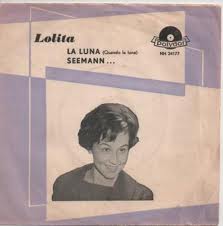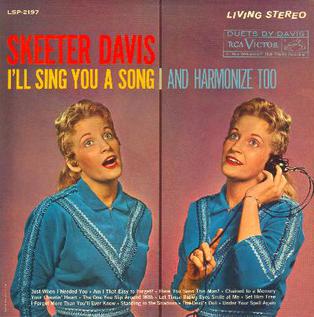Related Research Articles

"That'll Be the Day" is a song written by Buddy Holly and Jerry Allison. It was first recorded by Buddy Holly and the Three Tunes in 1956 and was re-recorded in 1957 by Holly and his new band, the Crickets. The 1957 recording achieved widespread success. Holly's producer, Norman Petty, was credited as a co-writer, although he did not contribute to the composition.

"Itsy Bitsy Teenie Weenie Yellow Polkadot Bikini" is a novelty song telling the story of a shy girl wearing a revealing polka dot bikini at the beach. First released by the Swedish artist Lill-Babs in 1956. The English version was written by Paul Vance and Lee Pockriss and first released in June 1960 by Brian Hyland, with an orchestra conducted by John Dixon. The Hyland version reached number one on the Billboard Hot 100, selling a million copies in the US, and was a worldwide hit. The song has been adapted into French as "Itsy bitsy petit bikini" and into German as "Itsy Bitsy Teenie Weenie Honolulu-Strand-Bikini", reaching number one on national charts in both languages. Several versions of the song have proved successful in various European countries. In 1990 a version by British pop band Bombalurina, titled "Itsy Bitsy Teeny Weeny Yellow Polka Dot Bikini", reached number one on the UK Singles Chart and in Ireland.
Zeeman may refer to:

Caterina Valente is an Italian-French multilingual singer, guitarist, dancer, and actress. Valente is a polyglot; she speaks six languages, and sings in eleven. While she is best known as a European performer, Valente also spent part of her career in the United States, where she performed alongside Bing Crosby, Dean Martin, Perry Como, and Ella Fitzgerald, among others.
Charles Randolph Grean was an American producer and composer.

"Let It Be Me" is a popular song originally published in French in 1955 as "Je t'appartiens" interpreted by Gilbert Bécaud. It became popular worldwide with an English version by the Everly Brothers and later with the duet by Betty Everett and Jerry Butler.

"The End of the World" is a pop song written by composer Arthur Kent and lyricist Sylvia Dee, who often worked as a team. They wrote the song for American singer Skeeter Davis, and her recording of it was highly successful in the early 1960s, reaching the top five on four different charts, including No. 2 on the main Billboard Hot 100. It spawned many cover versions.
"I Forgot More Than You'll Ever Know" is a song, written by Cecil Null.
"I'm in the Mood for Love" is a popular song published in 1935. The music was written by Jimmy McHugh, with the lyrics by Dorothy Fields. The song was introduced by Frances Langford in the movie Every Night at Eight released that year.
"He'll Have to Go" is an American country and pop hit recorded on October 15, 1959, by Jim Reeves. The song, released in the fall of 1959, went on to become a hit in both genres early in 1960.
Gloria Jeanne Black was an American country music singer.

The discography of Skeeter Davis, an American country artist, consists of 31 studio albums, 15 compilation albums, four tribute/cover albums, five collaborative albums, 57 singles, two charting b-sides, and four singles with other artists.

"Seemann " is a song originally written in German by Werner Scharfenberger and lyricist Fini Busch. A 1959 German-language recording by Lolita became an international hit in 1960–61.

Vanessa Chinitor is a Belgian singer, best known outside Belgium for her participation in the 1999 Eurovision Song Contest.

I'll Sing You a Song and Harmonize Too is the debut studio album by American country artist Skeeter Davis. The album was released in November 1959 by RCA Victor and was produced by Chet Atkins. It signified Davis' first solo album ever released after departing from the duo, The Davis Sisters.

Here's the Answer is the second studio album by American country artist Skeeter Davis. The album was released in January 1961 on RCA Victor Records and was produced by Chet Atkins. The album consisted of cover versions of hit singles by country artists and answer songs to the hits.
"Beautiful Lies" is a song written by Jack Rhodes and recorded by American country music artist Jean Shepard. It was released in September 1955. The song reached number 4 on the Billboard Most Played C&W in Juke Boxes chart.
"Under Your Spell Again" is a song co-written and recorded by American country music artist Buck Owens. The song peaked at number 4 on the U.S. Billboard Hot Country Singles chart.
"My Last Date " is a song written by Boudleaux Bryant, Floyd Cramer, and Skeeter Davis. In 1960, Skeeter Davis recorded and released the song as a single for RCA Victor. The song was an answer song to Floyd Cramer's country pop crossover hit that year titled "Last Date". Skeeter Speaks the first two lines in the Bridge section of the song.
"Sailor" is the title of the English-language rendering of the 1959 schlager composition "Seemann " originally written in German by Werner Scharfenberger and lyricist Fini Busch : featuring lyrics in English by Norman Newell, "Sailor" would in 1961 afford Petula Clark her first UK #1 hit, simultaneously granting Top Ten success to Anne Shelton while also bringing her chart career to a close. Clark was also afforded international success with both her recording of "Sailor" and also with Marin the French-language rendering of the song.
References
- ↑ "Jeanne Black, "He'll Have to Stay" Single Release" . Retrieved November 26, 2016.
- ↑ "Jeanne Black, "He'll Have to Stay" Chart Positions" . Retrieved November 26, 2016.
- ↑ "Jeanne Black, A Little Bit Lonely" . Retrieved November 26, 2016.
- ↑ "Billboard Top 100 - 1960". Archived from the original on January 2, 2014. Retrieved November 26, 2016.
- ↑ "Caterina Valente, "Zeeman (Je Verlangen Is De Zee)" Single Release" . Retrieved November 26, 2016.
- ↑ "Ann-Louise Hanson, Aldrig På En Söndag EP" . Retrieved November 26, 2016.
- ↑ "Skeeter Davis, Here's the Answer" . Retrieved November 26, 2016.